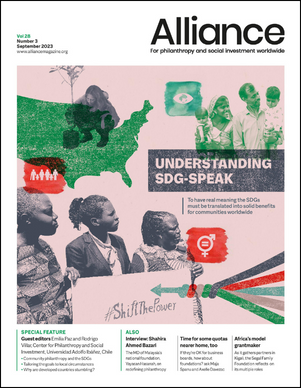In December 2015, Alliance published a special feature on philanthropy and the Sustainable Development Goals. Titled Why philanthropy should care about the SDGs, the issue’s guest editors, Heather Grady, Bheki Moyo and Sevdalina Rukanova, hailed the new ‘Global Goals’ as ‘one of the most important shifts in international cooperation of the last 50 years.’
My tenure as editor at Alliance began shortly after we published that feature and I recall the sense of optimism. ‘For the first time, the world has universal development goals, representing a pivotal shift in development paradigms,’ our editors gushed. Moreover, the goals ‘reflect the interconnectedness of social, economic and environmental challenges, as well as the need to tackle inequality, and address governance and corruption issues.’
This was an auspicious moment for philanthropy, too, ‘an opportunity to leverage both financial and non-financial assets, achieve greater scale, increase impact, and advance the accountability of institutions.’ And to influence how the SDGs are implemented.
Our latest special feature Understanding SDG-speak therefore is a timely moment to reflect on progress of the SDGs.
First the positives
The vision that the SDGs apply everywhere has proved an important milestone in universalising global development conversations and accelerated some re-balancing between the Global North and South. In doing so, they have reflected and driven conversations about decolonisation, debt, reparations and re-thinking, paving the way for a new language of international development – rooted in decolonisation and localisation.
The SDGs have also proved an important site for the internationalisation of philanthropy. Today, there are far more global organisations at philanthropy conferences than before.
The SDGs have also proved an important site for the internationalisation of philanthropy. Today, there are far more global organisations at philanthropy conferences than before. At Philea in May, these included representatives of the UN, World Bank, International Labour Organisation, and the German development agency among others.
Equally, philanthropy is a far more visible and powerful force at international fora. COP26 in Glasgow was a good example, where major foundation leaders shared stages and made announcements about methane and deforestation alongside ministers and government officials. The spectacle of muscular philanthropy is not to everyone’s taste – especially with Jeff Bezos’s presence through his Earth Fund dividing opinion – but it is an indication of a growing recognition of philanthropy on the global stage.
More prosaically, the SDGs have become an important organising principle for philanthropy. As an example, Rockefeller Philanthropy Advisors helped the Calouste Gulbenkian Foundation in Portugal map its work onto the SDGs so it could assess its contribution to the goals and its progress against them.
There is more cross-sector collaboration rooted in the SDG framework today and, with it, new working relationships emerging between philanthropy and government. The Global Energy Alliance for People and Planet – an Ikea Foundation, Rockefeller Foundation and Bezos Earth Fund backed initiative – is working with governments around the world to advance its mission for a transition to renewable energy.
The headline goals 1 and 2 – ‘no poverty and zero hunger’ – must seem risible for millions of people around the world unable to feed their family.
But we should be wary of confusing activity for progress. Are we any closer to achieving the goals?
That’s a hard question to answer arguably because rather than in spite of 17 goals, 169 targets, and 232 indicators.
Certainly, the headline goals 1 and 2 – ‘no poverty and zero hunger’ – must seem risible for millions of people around the world unable to feed their family.
There are also increasingly evident trade-offs on the path to sustainable development. Some fear that demands for action on environmental protection and climate change could slow down economic growth in the Global South and thus undermine wealth creation in emerging economies. Gbenga Oyebode, the new chair of the Africa Philanthropy Forum, whose law firm has acted for multinationals in Nigeria, told Alliance earlier this year that in light of the needs of a booming population ‘it’s too early to discuss how Africa will stop exploration and production of fossil fuels’.
In the context of the SDGs, foundations should also face scrutiny in how they approach the trade-off between development and human rights. For example, the Gates Foundation has supported and recognised the work of the Indian government on its major sanitation programmes. But in doing so, concerns have been raised that the legitimacy they bestow forestalls domestic efforts to pressure the Indian president Narenda Modi into respecting the human rights of its minority population.
Certainly, there is less optimism in this special feature than eight years ago. The guest editors of this issue, Emilia Gonzáles and Rodrigo Villar in Chile strike a defiant note: ‘We are losing this battle. Does it mean that we should abort the mission? We don’t think so.’
Instead, they point to new directions and possibilities around ‘regenerative development’ and ‘community-based economies’. Let’s hope these come to fruition as part of possible future goals post 2030.
One thing is sure. The language of development is likely to shift. What is less certain is whether the realities for millions around the world will improve long after terms like decolonisation and localisation have gone out of fashion.
Charles Keidan, Executive editor




Comments (0)